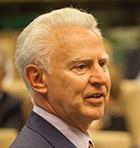Organizational Behavior
-

-

- Harvard Business Review
Culture is not the culprit
When Organizations Are in Crisis, It's Usually Because the Business is Broken.
By: Jay Lorsch and Emily McTague
- Harvard Business Review
Culture is not the culprit
When Organizations Are in Crisis, It's Usually Because the Business is Broken.
By: Jay Lorsch and Emily McTague -

We blame women for not taking the lead in the workplace. Here's why that's wrong.
By: Robin ElyWomen and men alike make a lot of assumptions about women. Yet when it comes to women and work, some of the most ubiquitous beliefs are the most mistaken.

We blame women for not taking the lead in the workplace. Here's why that's wrong.
By: Robin ElyWomen and men alike make a lot of assumptions about women. Yet when it comes to women and work, some of the most ubiquitous beliefs are the most mistaken.
-

2015 Thinkers50 Innovation Award
By: Linda A. HillProfessor Linda Hill won the 2015 Thinkers50 Distinguished Achievement Award for Innovation. She was also ranked #6 overall on the Thinkers50 ranking.

2015 Thinkers50 Innovation Award
By: Linda A. HillProfessor Linda Hill won the 2015 Thinkers50 Distinguished Achievement Award for Innovation. She was also ranked #6 overall on the Thinkers50 ranking.
-


-

- HBS Working Knowledge
CEOs and Coaches
How Important is Organizational 'Fit'?
By: Boris Groysberg & Abhijit NaikHow big a factor is matching the right coach with the right team?

- HBS Working Knowledge
CEOs and Coaches
How Important is Organizational 'Fit'?
By: Boris Groysberg & Abhijit NaikHow big a factor is matching the right coach with the right team?
-

- HBS Working Knowledge
Is it Worth a Pay Cut to Work for a Great Manager (Like Bill Belichick)?
By: Boris Groysberg & Abhijit Naik
- HBS Working Knowledge
Is it Worth a Pay Cut to Work for a Great Manager (Like Bill Belichick)?
By: Boris Groysberg & Abhijit Naik -


- HBS Working Paper Series
Does 'What We Do' Make Us 'Who We Are'?
Organizational Design and Identity Change at the Federal Bureau of Investigation
By: Ranjay Gulati, Ryan Raffaelli, and Jan Rivkin

- HBS Working Paper Series
Does 'What We Do' Make Us 'Who We Are'?
Organizational Design and Identity Change at the Federal Bureau of Investigation
By: Ranjay Gulati, Ryan Raffaelli, and Jan Rivkin
About the Unit
Through its research, teaching, and course development, the Organizational Behavior Unit creates and disseminates knowledge that advances the understanding of how to lead and manage with the aim of increasing personal and organizational effectiveness. Although specific research interests span a wide range of subjects, the faculty share a problem driven, interdisciplinary, multi method approach that has led to significant impact on theory and practice.
Our current intellectual agenda builds on the rich history of OB at HBS and focuses squarely on the organizational changes and challenges arising from today's increasingly global and more competitive economy. In the last decade, the faculty have been recognized for their work on leadership in an increasingly diverse and dynamic environment, the evolution of managerial careers in our society, managing diversity, and organizational design and change to meet evolving needs and expectations in a changing world.
Recent Publications
Division of Labor, Multiplication of Gratitude? Gratitude and Resentment Within Households
- October 2025 |
- Article |
- Journal of Marriage and Family
Performance or Principle: Resistance to Artificial Intelligence in the U.S. Labor Market
- 2025 |
- Working Paper |
- Faculty Research
OCP Group: Transforming for a Sustainable Future
- October 2025 |
- Case |
- Faculty Research
Subordinating Humanism: How Colliding Beliefs About a Living Wage Shape Personal Fulfillment and 'Professional-Class' Identities in Working-Class Jobs
- October 2025 |
- Article |
- Academy of Management Journal
Note on Higher Education in the United States
- September 2025 |
- Technical Note |
- Faculty Research
How to Keep Your Team's Spirits Up in Anxious Times
- September 8, 2025 |
- Article |
- Harvard Business Review (website)
Cristina Ventura at White Star Capital
- September 2025 |
- Case |
- Faculty Research
Raymond Jefferson: Trial by Fire
- September 2025 |
- Teaching Note |
- Faculty Research
Harvard Business Publishing
Seminars & Conferences
There are no upcoming events.
